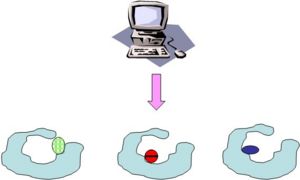Molecular docking: Difference between revisions
Jump to navigation
Jump to search
No edit summary |
No edit summary |
||
| Line 5: | Line 5: | ||
[[Category:Docktionary]] | [[Category:Docktionary]] | ||
[[Category:Jargon]] | |||
[[Category:Articles to be expanded]] | [[Category:Articles to be expanded]] | ||
Revision as of 21:13, 20 September 2007
| File:Wiktionary-logo-en.svg | Look up molecular docking in Wiktionary, the free dictionary. |
Molecular docking is the process of posing and scoring small molecules in the binding sites of macromolecules, usually proteins. In low throughput, it can be used for understanding a structure activity relationship series. In high throughput, also called virtual screening, it can be used for ranking a database of small, often drug-like molecules from best to worst according to some scoring scheme. Top scoring compounds are inspected for purchase or, in the case of a virtual library, synthesis.
DOCK is the implementation of molecular docking and virtual screening that we develop and use at UCSF.
